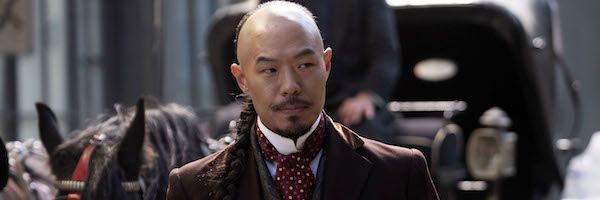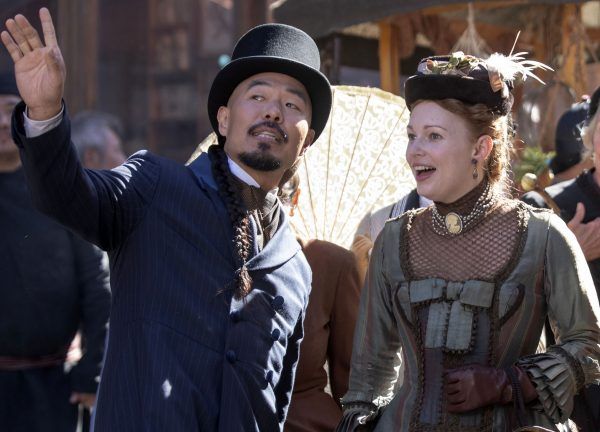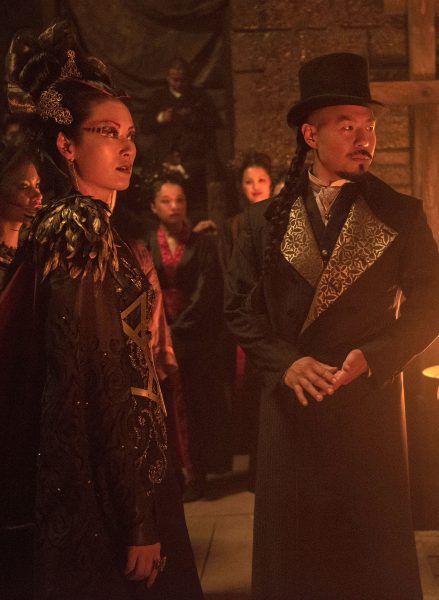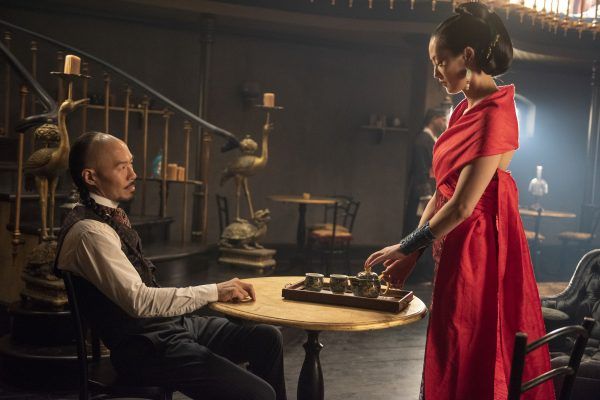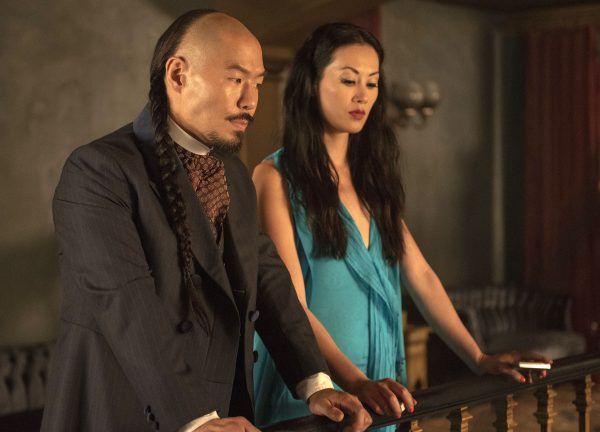From executive producers Shannon Lee and Justin Lin, and showrunner Jonathan Tropper (Banshee), the 10-episode Cinemax action-packed drama series Warrior, based on writings from martial arts legend Bruce Lee and set during the brutal Tong Wars of San Francisco’s Chinatown in the second half of the 19th century, follows Ah Sahm (Andrew Koji), a young man who’s left China behind for San Francisco under mysterious circumstances, only to realize just how challenging that can be. Now that he’s become a hatchet man for one of Chinatown’s most powerful Chinese organized crime families, violence is erupting all around him and he must decide which boundaries are worth crossing and which might be too dangerous to survive.
During this 1-on-1 phone interview with Collider, actor Hoon Lee (who plays Chinatown fixer and profiteer Wang Chao) talked about playing a role that was written specifically for him, the similarities between Job (his character on Banshee) and Wang Chao, the extra level of weight to the responsibility of tackling material that’s based on the writings of Bruce Lee, being immersed in the environment created by such detailed sets, how the costumes help inform the character, trusting where the writers will take things, and whether we’ll have a better understanding of who his character is, by the end of the season.
Collider: First of all, congrats on Season 2!
HOON LEE: Thanks!
Your showrunner, Jonathan Tropper, wrote this character specifically for you. How long ago did he tell you that he was developing this show and that he was writing you a character, and what was your reaction to learning that he was doing that?
LEE: He first mentioned the genesis of the project in the last season of Banshee. At that point, there had been conversations about it, but it was hard to know how far along things had gotten because it’s a business where you don’t want to count chickens. He had mentioned that there was a part there that he was thinking of for me, and I was very flattered by that. I had a very good working relationship with Jonathan on Banshee, but you never want to take anything for granted. I just assumed it would be the sort of thing where, when the time came, I would ask him to have a crack at it. He was pretty forthcoming that Wang Chao was going to be an interesting character for me to try on. I was just hoping it would all come to fruition, and was fortunate that it worked out the way it did. Schedules are always in flux, on both ends, and you never quite know if things are going to all come together and interlock the way that you would hope, but I did try to keep myself available for this project because I thought it was going to be pretty special, and I was looking forward to the opportunity to work with Jonathan again. I’m glad it happened.
After playing a character as memorable as Job was in Banshee, did you want to be very careful and selective about the types of roles that you would do, following that?
LEE: Yes and no. I guess you look for similar traits, in any role. You want something that excites you. If it’s a character that had superficial similarities to Job, but had different core values, or functioned in a different way, I wouldn’t have said no, out of hand. It’s much more important to feel challenged, feel like you’re growing, and feel like you’re excited about the story that you want to tell with the character. Most importantly, you want to feel excited about the team you’re going to work with, and the possibilities of having a really good work experience. That’s really important to me. I wasn’t running away from any particular quadrant. On some level, it’s as big a mistake to do that, as it is to stay within a specific wheelhouse. You just have to evaluate each thing on its own merits.
It also would probably be very difficult to come across another character that’s anything like Job.
LEE: I think there are certain similarities between Wang Chao and Job, certainly with the level of intelligence of the characters, their wittiness, and the fact that both characters keep their values quite close to them. They’re also naturally suspicious people. So, I do see some similarities there, and I think that’s part of the reason Jonathan had me in mind. Obviously, I would also fit into this world and the ethnic make-up of the world pretty easily. But I enjoy playing smart characters, and I’ve had the good fortune of having Jonathan write smart characters that I get to play.
For fans of Banshee, Job was definitely a very special character to them. Is he a character that will always hold a special place in your heart, as well?
LEE: Job is a real iconic role for me. I can’t really speak to how other people received him. I was happy that people seemed to enjoy him, as much as I enjoyed playing him. I didn’t often hear that people hated him. I tended to hear a lot of good things, but you never know if there’s some other portion of the population that just couldn’t stand him. He was so challenging and interesting and fun, and he was also a very principled character actually, in many ways, at his core. I had no complaints about playing him, ever. I just felt that he was a complete gift. He made me a better actor, and kept me stimulated and focused and challenged, for the entire rest of the show. There’s really not much more you can ask for, from a job or from a character, than that.
When you do a show like Warrior, that’s taken this 50-year journey to actually finally get made, is there an extra level of weight to the responsibility of tackling material that’s based on the writings of Bruce Lee?
LEE: Bruce Lee being the icon that he is, there’s an inevitable amount of weight, as you say, but it’s our job to ignore that. I think we serve it best by trying to make the most entertaining show that we can. If there’s one core philosophy that Bruce Lee espouses, in many different ways and forms, it’s the idea of expressing individuality and expressing one’s self honestly. As a general concept, that’s something that the show needs to continue to try to do. If we fall into the trap of becoming a tribute show, or some strange imitation show, we’ll be working in exact opposition to a lot of the core philosophy that people think of, when they think of Bruce Lee. In many ways, the nature, his own philosophy and the nature of his life gives us permission to pursue this show on its own merits and its own terms. That’s the way that we actually honor his memory best, and it’s also the way that we honor our own work the best.
It’s pretty remarkable when you watch the show, because it does feel like the essence of Bruce Lee is there, without it trying too hard to be Bruce Lee.
LEE: Yeah. If you were to try to create a character that imitated Bruce Lee, that’s a no-win scenario. What we’ve done, thus far, has been really fun. It’s fun to see these homages to Bruce Lee pop up and get distributed throughout the world. If you think of this world as a Bruce Lee inspired playground, that’s enjoyable and fun. It doesn’t take itself too seriously, on that level. I’m happy to see when Andrew Koji does some little gesture that is reminiscent. That’s the smarter way to recognize the initial source material.
It’s incredible to look at this show and think about how it all had to be built in South Africa. Whether the show is 100% accurate or not, it certainly feels real. What was it like to walk onto the set, every day, and be immersed in and surrounded by this incredible environment?
LEE: I love our production design, our sets, and our incredible team of builders and craftsman who work down here. We are hugely in debt to them. They’ve made aspects of this job incredibly easy. If you were to walk onto our back lot, you are suddenly in a different world. The fact that we are working on a practical set, as opposed to a bunch of green screen sets, it allows us to concentrate on other things, and it makes it incredibly engaging and fun to simply play in the environment, itself. I can’t overstate the significance and the presence of the sets, the costumes, and the practical special effects, in the creation of the world. It’s nice to feel proud of those things, as a cast member. When we have visitors or family come to see the studio, we are just so proud to show them the environment that we get to occupy, and they’re invariably completely blown away. I feel incredibly lucky for that.
This character doesn’t quite have the same fashion sense that Job did, but he definitely has a very specific look. How much do the costumes help inform things for you?
LEE: So, Wang Chao is somebody who exists between both the Irish or Caucasian world and the Chinese world, so his dress and manner presentation reflects that. As you start to learn more about him, you come to understand that he has a little bit of an unusual background. He’s somebody that takes quite a bit of pride in being able to exist in those two environments. His use of English is quite good, so he’s able to negotiate with the police and with the Tongs. His manner of dress reflects the western style, but it also defies some expectations, in that way. He wears a fairly traditional hairstyle, but then tries to present in a more modern western manner of dress. He’s also punching up a little bit. He sees himself as an up-and-comer, in this new world, so he dresses for that, as well.
Both Jonathan Tropper and Shannon Lee have said that they see a lot more story to tell in this world. Have you had conversations about where things could go, and do you have a personal wishlist of things that you would like to see happen with this character?
LEE: I don’t tend to think of things like personal wish list. To me, the writers are the writers, and they’re the guardians of the story, so that’s their job. They’re amazingly collaborative, and they’re open to hearing things, which is not a typical thing, and I don’t take it for granted, but I do think that, just as I would hope people respect my job, I try to respect other people’s jobs. The writers are there to craft the stories, and Jonathan, specifically, is there to tell me who the character is. What I try to do is mine the material that I’m given and let that cook in the background, and if I offer up some thoughts, they tend to be fairly well-received because they’re born from the original pool of thoughts and ideas that fueled the character, to begin with. I don’t take a lot of time to think like, “Well I really want this to happen to Chao.” I trust that they’ll find a lot of interesting things, on their own, and things that I would never think of. Just to broadly generalize, sometimes actors seek things for their character out of vanity or protection, but when somebody else brings an idea to your character that maybe you’re uncomfortable with, those things tend to bear better fruit because they push you. So, I would never want to steer Chao. It’s more fun for me to figure out how to solve the problems that are presented to me.
Wang Chao is such an interesting character because he does feel like he’s the most mysterious and the biggest wildcard of the bunch. By the end of this season, do you think audiences will have a better understanding of who he is, or will he still feel like a mystery?
LEE: There will still be a lot of unanswered questions, but some blanks will start to get filled in. What’s exciting about the show, in general, is that what you’re really looking at is a town that’s a powder keg. Ah Sahm comes to this environment and that spark is a catalyst for all of these different entities that already exist and these things that are already in motion. Just like Young Jun, Ah Toy and Mai Ling, Ah Sahm’s presence in this world catalyzes something in Chao, as well. You’ll start to get a better sense of that, as the season progresses, but what we’re really looking at is how this one new person steps into a world that’s in motion and starts to upset the balance of everything. Chao is somebody who makes his way by surfing the waves of politics, intrigue, power and dissonance, where he’s naturally going to be drawn to that, but he’s also riding those changing waves, just like everybody else.
I love how this is a show that can be really badass and, at the same time, actually teach something about history.
LEE: Yeah. They never set out to make a docudrama. They always wanted to make it about entertainment, first and foremost. But there’s so much material from that era that gets incorporated into the storylines. Even if it’s not a perfectly accurate depiction, there will be some event that inspires a series of plot points. What I find interesting is that, when people have a question in their mind while watching the show, even if the literal thing we depict in the show didn’t happen, chances are that it’s based in something that did. I hope that people use the show, first and foremost, as something to enjoy, but it can also be something of a rabbit hole that takes people further into the exploration of the actual history of what happened in San Francisco, at that time. It’s staggering how little we know of it, in terms of our general education and how much we’re taught, so I’m hoping it starts to raise questions for people.
Warrior airs on Friday nights on Cinemax.

